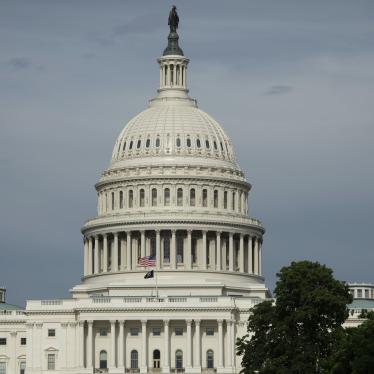Human rights in the United States and abroad were central to the issues raised throughout the presidential debate last night between Vice President Kamala Harris and former President Donald Trump:
1. Neither candidate centered human rights in their comments on border and immigration policy. Harris said she had supported a border bill that would have “put 1,500 more border agents on the border to help those folks who are working there right now over time trying to do their job [and] put more resources to allow us to prosecute transnational criminal organizations for trafficking in guns, drugs and human beings.” Trump said multiple times, “we [are] allowing these millions of people to come through on the southern border,” and also said, “I'll tell you what I would do ... Go down to Washington, D.C. And ... sign a bill to close up the border.” In response to a question about his proposal for the largest domestic deportation operation in the history of the country using the National Guard, Trump said he would also use “local police.”
Neither candidate acknowledged the US’ legal obligation not to return refugees to harm. Neither called for fair, orderly, and humane procedures for immigrants and asylum seekers nor acknowledged the country’s obligations to respect rights to family unity and due process.
2. The debate over access to abortion has changed since the US Supreme Court overturned Roe v. Wade in 2022, rolling back the constitutional protection for this essential healthcare right and handing power to individual states. Trump said, “Each individual state is voting [on abortion]. It's the vote of the people. Now it's not tied up in the federal government.” When moderators asked if he would veto a national abortion ban, he did not specifically answer. Harris said, “I pledge to you when Congress passes a bill to put back in place the protections of Roe v. Wade as president of the United States, I will proudly sign it into law.”
Candidates should publicly support efforts to protect the rights of approximately 22 million women and girls of reproductive age, as well as other people who can become pregnant, who now live in US states where abortion access is heavily restricted or totally inaccessible. States and the federal government need to provide access to safe and legal abortion and end criminalization efforts as part of their human rights responsibilities.
3. On the issue of phasing out fossil fuels, Harris said, “I will not ban fracking,” and Trump said, “I got the oil business going like nobody has done before.”
A human rights centered approach to this issue would require the US to end all forms of support for new oil, gas, and coal development to rapidly reduce emissions in line with its obligations and limit the human rights impacts of climate change. Policies on fossil fuels should center the health and rights of frontline communities, where people of color are disproportionately exposed to pollution.
4. Harris said it was time to “stand for our democracy” and Trump said that “they’re [the Democratic party] the threat to democracy.” The former president mentioned he was endorsed by the Hungarian prime minister, noting that Viktor Orbán said “the most respected, most feared person is Donald Trump. We had no problems when Trump was president.” Human Rights Watch has reported that Orban has crippled the rule of law and democratic institutions in Hungary, attacked LGBT and minority communities, and made it mandatory for women seeking abortions to listen to a fetal heartbeat.
A human rights approach to democracy and voting rights in the US requires following the ten principles on elections and human rights noted by Human Rights Watch and the enactment of legislation like the John Lewis Voting Rights Advancement Act and the Freedom to Vote Act. This legislation would ensure people do not face discrimination and restrictive barriers as they try to vote.
5. On housing, Harris said, “We know that we have a shortage of homes and housing, and the cost of housing is too expensive for far too many people.” She also said that "access to affordable health care should be a right." Trump did not address housing specifically. On health care Trump said, “If we can come up with a plan that's going to cost our people, our population less money and be better health care than Obamacare [the Affordable Care Act], then I would absolutely do it.”
The rights-based solution to these issues is more affordable and accessible housing for all and moving towards a healthcare system that is universally accessible and affordable for all, regardless of people’s ability to pay. These policies would ensure everyone can equally enjoy their rights to health care and education.
6. On Gaza, Harris said “Israel has a right to defend itself … and how it does so matters. Because it is also true far too many innocent Palestinians have been killed.” Trump said, “If I were president it would have never started.”
Candidates should commit to upholding international law and US law in relation to the ongoing war. The federal Foreign Assistance Act prohibits security assistance to any government that restricts the delivery of US humanitarian aid. The better-known Leahy laws prohibit weapons from going to military units that have committed gross violations of human rights.
Neither candidate centered key rights issues in their discussion of foreign policy challenges, such as the wars in Ukraine and Sudan and widespread violence and food insecurity in Haiti.
For more about the rights at stake in November, read our Human Rights Guide to the 2024 US Election.










